

An AMC conference of many lasting memories
GOOD DAY FELLOW MARKETERS! WELCOME
to the 3rd issue of our magazine for 2023. I say this wide-eyed as I realise that we are hurtling towards the end of a remarkable year for the AMC.
The highlight has undoubtedly been our 2nd annual Marketing Conference in Entebbe, Uganda in early September. Last year the Marketing Association of Zimbabwe (MAZ) was our host, and this year the baton passed to the Uganda Marketers Society (UMS).
We enjoyed an amazing event, with great credit going to UMS President, David Balikuddembe, his deputy Sandra Arinaitwe and their team. Plus, of course, the marketers and people of Uganda who showed such great enthusiasm and hospitality.
I also say a big thank you to our AMC team. And the many marketers and member associations who joined us. Apart from the inspirational insights from the speakers, there were great opportunities to network and learn from fellow African marketers.
It was also heartening to see the interest in the AMC from non-member countries. We were honoured to welcome observers from marketing bodies in Ethiopia, Rwanda, South Sudan and Tanzania. I confidently predict that the AMC will soon have new additions to our membership list!
Lastly, I congratulate the Marketing Society of Kenya (MSK) on being awarded the 2024 African Marketing Confederation Conference. It was an honour to pass on the baton to MSK Chair, Zuhura Ogada-Odhiambo, MSK CEO, Edward Oswe, and their team.
They have big shoes to fill. But they have already shared some of their plans with me and it is shaping up to be yet another awesome event.
Yours in African marketing, Helen McIntee
BA MBA (Wits) CM (SA)
President: African Marketing Confederation
LE MESSAGE DU PRÉSIDENTE DE LA CONFÉDÉRATION AFRICAINE DU MARKETING
Une conférence de l’AMC remplie de
souvenirs impérissables
BONJOUR CHERS SPÉCIALISTES DU MARKETING ! Bienvenus dans le troisième numéro de notre magazine pour 2023. J’écris cela les yeux écarquillés, me rendant compte que nous arrivons vers la fin d’une année remarquable pour l’AMC.
Le point culminant aura sans aucun doute été notre seconde conférence annuelle sur le Marketing, qui s’est tenue à Entebbe, en Ouganda, au début du mois de septembre. L’Association de Marketing du Zimbabwe (MAZ) nous avait accueillis l’année dernière, et cette année, l’Uganda Marketers Society (UMS) a pris le relais.
Nous avons assisté à un évènement extraordinaire, dont le mérite revient au président de l’UMS, David Balikuddembe, à son adjointe Sandra Arinaitwe et à leur équipe. Sans oublier, bien sûr, les spécialistes du Marketing et nos hôtes ougandais qui ont fait preuve d’un grand enthousiasme et d’une hospitalité chaleureuse.
J’adresse un grand merci à l’équipe de l’AMC et aux nombreux spécialistes du Marketing et associations membres qui se sont joints à nous. Outre l’inspiration apportée par les orateurs, ce fut une excellente occasion de nouer de nouveaux contacts et d’apprendre des collègues spécialistes du Marketing en Afrique.
Il est également encourageant de constater l’intérêt que portent les pays non-membres à l’AMC. Nous avons eu l’honneur d’accueillir des observateurs d’organismes de d’Éthiopie, du Rwanda, du Sud-Soudan et de Tanzanie. Je prédis avec confiance que l’AMC ajoutera bientôt de nouveaux membres à sa liste !
Enfin, je félicite la Marketing Society of Kenya (MSK) de s’être vu attribué la prochaine conférence 2024 de la Confédération africaine du Marketing. Ce fut un honneur de passer le relais à la présidente de la MSK, Zuhura Ogada-Odhiambo, au directeur général de la MSK, Edward Oswe, ainsi qu’à leur équipe.
Ils ont beaucoup à faire. Mais ils m’ont déjà fait part de certains de leurs projets, qui prédisent un nouvel évènement grandiose.
Je vous souhaite une bonne continuation dans le domaine du Marketing africain,
Helen McIntee BA MBA (Wits) CM (SA) Présidente de la Confédération africaine du Marketing
Strategic Marketing africa
PUBLISHER
African Marketing Confederation https://africanmarketingconfederation.org info@africanmarketingconfederation.org
PUBLISHING COMMITTEE
Kwabena Agyekum (Chair)
Gillian Rusike
Helen McIntee
Nigel Tattersall
Mike Simpson
A.M.C. PRESIDENT
Helen McIntee
A.M.C. SECRETARY-GENERAL
Gillian Rusike
EDITORIAL
Simpson Media
Editor: Mike Simpson mike@media-simpson.com
ADVERTISING SALES & COORDINATION
Avenue Advertising
Managing Director: Barbara Spence
Landline: +27 11 463 7940
Mobile: +27 82 881 3454 barbara@avenue.co.za
DESIGN & LAYOUT
Tamlin Lockhart Design tamlin@tamlinlockhart.co.za
PRODUCTION
Reproduction: Tamlin Lockhart Design
Digital magazine: Smart Procurement World Print magazine: Business Print
IN ASSOCIATION WITH
Chartered Institute of Marketing, Ghana
Marketers Association of Zimbabwe
Marketing Society of Kenya
Moroccan Association of Marketing and Communication
National Institute of Marketing of Nigeria
Institute of Marketing in Malawi
Institute of Marketing & Management, Mauritius
Institute of Marketing Management, South Africa
Uganda Marketers Society
Zambia Institute of Marketing
Africa’s marketers are on the march!
WELCOME TO OUR THIRD issue of Strategic Marketing for Africa for 2023. In this magazine, you will see extensive coverage of the 2023 AMC Conference, which concluded in Uganda in early September.
As I look back on it, as well as at the previous conference held in Zimbabwe in 2022, I cannot but feel that something is brewing here in Africa. Marketers are on the march!
Having been involved with the AMC since 2013, I now sense a sea-change. Perhaps it has to do with the way digital technology is better connecting African marketers with each other and the world. Maybe it’s how our marketers are increasingly going out into the wider world and then returning with new insights.
Could it be simply a new-found confidence in ourselves that we can stand proudly on the global stage without sometimes feeling that we’re second best? Or that the first real stirrings of AfCFTA give us hope for a more united continent?
I can’t quite put my figure on it. But there is something different about the revitalised AMC, its member associations and the individual marketers within them. A new dynamism, a can-do attitude, a get-up-and-go that wasn’t there when I think back to 2013.
SENSE OF POSITIVITY
I saw it in the all-round excellence of the 2022 Zimbabwe conference and again at the 2023 Uganda conference. Good organisation, top speakers, great opportunities to learn from each other. Positivity. Togetherness.
Perhaps Yaw Nsarkoh, in his excellent and insightful conference presentation on marketing leadership captured it best: “The African
opportunity is for Africans to create. Nobody will come and do it for us. Never fear. Go for it!”
I was also fortunate to be involved in a round-table breakfast discussion on AfCFTA, organised by the Institute of Marketing Management of South Africa just prior to the conference.
What I saw there was a clear determination by those present to use their marketing expertise to help drive the process forward by cutting through needless red tape and barriers.
IN THIS ISSUE
In this issue of the magazine you will find extensive coverage of the 2023 Conference on pg 12, plus an analysis of the potential marketing opportunities being created by AfCFTA and BRICS on pg 20.
The positivity continues with our cover story (see pg 8) as we look at how bold African entrepreneurs are creating local sneaker brands to take on the big players – not just within Africa, but abroad too. All power to them!
Enjoy your latest read, courtesy of the African Marketing Confederation. Mike Simpson Editor
WE WELCOME YOUR INPUT
Our aim is to include the best marketing insights from across Africa, so we welcome your content ideas and press releases. By prior agreement with the Editor, we also accept suitable article contributions. Please note that the African Marketing Confederation supports ethical journalism, and all content is published solely at our discretion. We also do not trade editorial content in exchange for paid advertising.

Contents
COVERSTORIES
8 AFRICAN SUCCESSES
Can Africa’s emerging sneaker brands get a foot in the door and take market share from the big names?

12 A.M.C. CONFERENCE
Vibrant speakers, enthusiastic delegates and beautiful Lake Victoria were the backdrop for this gathering
30 OPINION
Why do so many global brands still develop their campaign strategies outside Africa, asks Emeka Ezeagu
THEFEATURES
20 TRADE AGREEMENTS
AfCFTA is a good news story of unity and positivity, which must be promoted within Africa and abroad
26
SUPPLY CHAIN
Multinationals are localising their African supply chain strategies due to unpredictability and forex volatility
28
INFORMAL RETAILING
Closing his unprofitable food stalls and opting for a hawker’s cart proved a game changer for a Kenyan trader
36 NEWSJACKING
The immediacy of social media and the 24-hour news cycle makes newsjacking a viable marketing tactic
40 SOCIAL MEDIA
A popular bread brand gets a boost as a cute little three-yearold’s photo session with her uncle goes viral
42 CUSTOMER EXPERIENCE
Companies must harness AI to free up their people to do what no robot can do – truly connect with customers
47 FRANCHISING
French supermarket chain
Carrefour unveils plans to open franchised neighbourhood stores across Morocco
48 A.M.C. NEWS
The first group of delegates for the Chartered Marketer (Africa) designation recently began their journey
50 A.M.C. MEMBER NEWS
Ugandan industry bodies, including marketers, came together for a Meet & Greet day of fun and networking

52 PUBLIC RELATIONS
Economic instability and industry ‘quacks’ and ‘charlatans’ are among the concerns of African PR practitioners
56 A.M.C. MEMBER NEWS
Top-notch speakers and big turnout for the National Institute of Marketing Nigeria’s annual conference in Abuja
THEREGULARS
6 INTRODUCING THE A.M.C.
The African Marketing Confederation is spearheading the development of the highest standards of marketing
DISCLAIMER
“As supplier of the goods/services, you, the Advertiser warrant that you are familiar with and will comply with the provisions of the Consumer Protection Act, Act 68 of 2008 (‘CPA’) in all transactions between us. Among other, the CPA provides for some consumer rights regarding delivery, returns, disclosure of information and product quality and safety. You accordingly indemnify the African Marketing Confederation against any damages that we or any other party may suffer as a result of your noncompliance with the CPA or as a result of any damages suffered by any party due to defective or unsafe goods/services supplied by you.”
NEXT ISSUE:
Turning the spotlight on radio in Africa
A public relations perspective from Botswana Evolution of South Africa’s township consumers Mars Wrigley expands Kenyan route-to-market strategy


Introducing the African Marketing Confederation
THE AFRICAN MARKETING
Confederation is the groundbreaking pan-African body of marketing professionals spearheading the ongoing development of the highest possible standards of marketing across Africa.
Founded in 2011, the AMC is a collaboration between the various national marketing bodies and associations to exchange expertise and information, as well as to promote the marketing profession as a whole.
By unifying the bodies in the various countries, the AMC is positioned to
THE MOROCCAN ASSOCIATION OF MARKETING AND COMMUNICATIONS
The Moroccan Association of Marketing and Communications (AMMC) was created in late 2013 as a dedicated platform to the country’s marketing and communication communities – including managers, directors and officers from large, medium and small companies operating in the private and public sectors. AMMC members contribute to strategic thinking related to topics and themes of common interest and organise networking and experiencesharing events. AMMC’s vision is to become the Moroccan reference for marketing and communication. Its defined mission is to promote the marketing and communication professions, to develop the skills and knowledge of professionals and to participate actively in the economic welfare of Morocco. https://www. facebook.com/AMMC.Maroc/
exchange expertise and information, provide intellectual capital and to ensure that the continent has a platform for like-minded marketing professionals at the highest level. The AMC aims to grow and support Leaders in Marketing in Africa, through this platform.
The AMC founding members are also fully committed to observing each country’s unique and varying cultures, languages, standards of education and levels of development which require homegrown marketing approaches designed and nurtured by Africans themselves.
CHARTERED INSTITUTE OF MARKETING, GHANA
The Chartered Institute of Marketing, Ghana (CIMG) was founded in July 1981 with the vision to be the voice of marketing practice in Ghana under the Professional Bodies Registration Act 1973 (NRCD143). The Institute aims at seeing organizations (both private and public) embrace the marketing concept, and be marketing oriented in their operations. In 2020, the CIMG received a Presidential Charter by the passage of the CIMG Act 2020 (Act 1021) with the main objects to set standards for the practice of marketing and to regulate the practice of the marketing profession in the country.
Visit Website
NATIONAL INSTITUTE OF MARKETING OF NIGERIA
The National Institute of Marketing of Nigeria is the body of professionals engaged in marketing and related fields as marketing practitioners: sales and marketing directors, commercial directors, customers’ managers, media planners, channel developers, creative directors, value builders, brand directors, corporate and institutional governors, transformers, communication experts, general managers, and chief executives.
Visit Website
IMM SOUTH AFRICA
The Institute of Marketing Management
South Africa (IMM) has for decades been the pre-eminent marketing institute in Southern Africa, bringing together likeminded individuals to share thoughts and experiences within the rapidly changing marketing environment. The IMM offers a wide range of value-added products and services for marketing professionals who are Associates in either an individual or corporate capacity. The IMM is a proud founding member of the AMC, providing you with the added benefit of developing a larger network across the African continent.
Visit Website
UGANDA MARKETERS SOCIETY
The Uganda Marketers Society (UMS) is the leading community and voice of marketing professionals in Uganda. The society brings together diverse professionals across different backgrounds, experiences and levels of seniority to network, learn and grow together. UMS is affiliated with the Chartered Institute of Marketing CIM-UK, the world’s leading professional marketing body. It is led by a diverse Board and Secretariat that
serve to ensure the society meets its goals. UMS started in 2015 with a vision to be the leading body of marketing practitioners and professionals inspired towards the development, promotion of professional ethics and standards, and application of world-class marketing leadership in Uganda. Its mission is to remain the most relevant influence informing Marketing in Uganda as a virtual community for professional marketers.
Visit Website
MARKETING SOCIETY OF KENYA
The Marketing Society of Kenya started as the Advertising Society of Kenya in 1962. It became the Marketing Society of Kenya in 1968. The first chairperson was Nigel Crouch, the then MD of Cadbury Schweppes. The Society’s main objectives are to develop, acknowledge and practice the profession of marketing, to provide services to members, and to offer a platform for self-regulation for practicing marketers.
Visit Website
MARKETERS ASSOCIATION OF ZIMBABWE
The Marketers Association of Zimbabwe was launched in 2007 with a vision to be a leading body of marketing professionals promoting professionalism of the highest standards and establishing channels of career development for the benefit of organisations and the economy at large.
Visit Website
THE ZAMBIA INSTITUTE OF MARKETING
The Zambia Institute of Marketing is a membership organisation regulating the practice of marketing in Zambia as provided for in the Zambia Institute of Marketing Act No. 14 of 2003.The Institute is affiliated to the Ministry of Commerce, Trade and Industry. The broad operating moralities of the Institute include: apolitical stance; impartiality and common good; capacity building; networking; and effective communication.
Visit Website
INSTITUTE OF MARKETING IN MALAWI
INSTITUTE OF MARKETING AND MANAGEMENT, MAURITIUS
Established in 1991, the Institute of Marketing & Management is the leading professional marketing education and training institution of Mauritius.
Visit Website
Institute of Marketing in Malawi (IMM) was formed in 2020 after transitioning from what was CIM Malawi Members Group which was formed in 2010. IMM is committed to ensuring that interests and needs of its members and stakeholders are understood and catered for throughout the organisation and the wider industry. Currently, IMM is the largest community of professional marketers in Malawi involved in several marketing activities such as networking of marketers in Malawi, organizing marketing events and training courses, setting best marketing practice standards in Malawi, promoting professional development of Marketers, study and education guidance to marketing students among others. IMM has become the face of Marketing in Malawi with the organization now referred to as the benchmark of marketing standards in the country.
African sneaker brands are showing some fancy footwork
By Cara BouwerFOR GENERATIONS, sharp dressers across Africa favoured gleaming leather shoes or traditional sandals incorporating rawhide, beads, wood and even metal.
Today, sneakers are all the rage as young Africans seek to show off their global street cred while, increasingly, also supporting home-grown creative brands. This is fuelling the rise of African sneaker brands, many of which have an eye for international expansion.
As things stand, the African sneaker market is a small player in a global industry dominated by the United States and expected to generate revenues of US$76-billion in 2023, according to Statista insights.
While the international market is on course for annual growth of 5.3% between 2023 and 2028, Africa’s emerging sneaker sector is poised for above-average 5.69% growth. Currently, revenues from Africa’s sneaker segment are around $2-billion annually.
These numbers indicate a relatively untapped market across Africa – an attractive prospect for African brands and big international players like Nike,
Adidas and Puma, which are seeing consumer appetite waning in developed markets. According to news agency Bloomberg, Nike was sitting on an amazing $8.5-billion in unsold goods in 2023.
It seems that, in spite of aggressive promotions, consumer budgets are tight and new players are out-innovating the old stars in the global sneaker market.
Africa, meanwhile, is riding a youth dividend. Speaking to ‘The Business of Fashion’, an online magazine covering the fashion industry, Nigerian fashion business consultant Rhoda Aguonigho explained that home-grown African sneaker brands were being boosted by a “vibrant streetwear community growing out of cities across the continent”.
With the world’s youngest population (around 70% of people in sub-Saharan Africa are under the age of 30), Africa is an increasingly attractive proposition for any brand with a long-term outlook.
In recent years, Nike has opened a flagship store in Lagos, while Adidas expanded to four stores in Nigeria.
Established German-based leather shoemaker Josel Seibel expanded its presence in Kenya, and fast-growing
New Balance is reinventing its brand by collaborating with street culture designers such as Salehe Bembury and Teddy Santis of the trendy Aimé Leon Dore fashion brand.
Visual artist Charles Etoroma recently tapped into his Nigerian culture (he is first-generation American) to produce a design series called New Balance Made in Africa.
EMERGING AFRICAN BRANDS
While established foreign players are looking to the continent, emerging African sneaker brands want a bite of both the local and foreign cherry. As a result, they are increasingly building brands that also appeal to the lucrative international market.
This ‘take-Africa-to-the-world’ business model is typical of many of the continent’s shoe brands, both the new kids on the block and more established businesses such as Sole Rebels, a hand-crafted Ethiopian brand, or dynamic South African offerings such as Bathu, Drip Footwear, Kicks Sportswear and Vaya Footwear.
Discussing Kicks’ move into the UK market, founder Sammy Mhaule told ‘CNN Business’: “It’s a no brainer … to align ourselves as an online platform in the UK while, at the same time, having a footprint in a [physical] store that will allow consumers to walk in and touch and feel our products.”
For Mhaule, Kicks’ expansion was also an opportunity to “bring a story from Africa to the world”.
Similarly, ICE Sneakers, the brainchild of Cameroonian Ayissi Williams, was created with the local and global market in mind, Williams told ‘Strategic Marketing for Africa’ in an interview.

“This is why we chose a name which can be adopted both in Cameroon and in foreign countries,” he explains.
“We obviously want to establish our brand in Africa first, but we also don’t want to limit it just to the African continent. We believe our brand can be successful in Africa and also be successful abroad. Our sneakers are
comfortable, unique and durable enough to be liked by any audience.”
ICE is a relatively new name in an increasingly competitive landscape which includes African sneaker companies such as Umoja Africa and Enda Athletic from Kenya, Nigeria’s sustainable SALUBATA brand, and PassportADV out of Ethiopia.

Registered in 2021, ICE only became operational in 2022, explains Williams, whose love of sneakers inspired him to create his own brand.
“After dropping out of university in 2016, I started learning about sneaker design by myself and the idea became a
Sneakers are more than just footwear

reality and operational in 2022,” he says, noting that he takes his inspiration from international brands like Nike, Adidas, Puma and New Balance.
The difference, of course, is the unique design inspiration he draws from Cameroon, and specifically his home city of Buea.
As the first local sneaker brand in the country, Williams says the response from his fellow Cameroonians has been
positive, supportive and encouraging. He has been careful to appeal to as broad a market as possible, being mindful to design products that appeal to all generations in his homeland, while also being aware of how this might translate on the world stage.
AN INTERNATIONAL APPEAL
So far, Williams says, the ICE brand has managed to catch the attention of the foreign market without a differentiated approach to advertising and marketing.
“The reason for this is because our designs are appealing to not only Cameroonians, but also to the international audience. In future, we might have a different approach for the international market if need be,” he adds.
Currently almost all of ICE’s marketing is via social media platforms such as Instagram and Facebook. “We also use some public figures, like celebrities, to showcase our sneakers to a wider audience. Currently, one of the best rappers from Cameroon is our brand ambassador,” says Williams,
referring to Mic Monsta.
As with New Balance’s approach, Williams is very aware that the African youth market is boosting the appeal of sneakers as a fashion statement and means of personal expression.

“The younger generations are more into sneakers and look at it as a culture and not just a footwear,” he explains. “They enjoy having several pairs in their collection, even if they don’t wear them often. Changes in fashion also contribute to the increase of sneaker sales in Africa; people are more likely to wear sneakers with a variety of outfits, unlike before where Africans were way too focused on specific dress codes.”
CHALLENGES FACE START-UPS
Reflecting on the challenges facing a new sneaker start-up business like ICE, Williams appreciates that the major global competitors have the expertise and resources to penetrate any market, including Africa.
“The best a new brand like us can do to stand our ground is to be unique and find an identity which Africans can
easily relate to,” he says. “We can also do our best to maintain quality, comfort and durability, which is something most of these major brands are beginning to slack on.”
On the other hand, there is a comfortable familiarity with big global brands, which makes it hard for startups to break into the African market.
This is particularly true when it comes to price. Williams explains: “People abroad are willing to pay more for our sneakers compared to most people in Africa, who still complain about our pricing.”
Until ICE can bring its manufacturing operations to Africa – rather than producing outside the continent – there is another line item to consider in the budget, which can prove extremely costly: logistics. Not only must shipping costs be factored into the equation, but also the costs and challenges of transporting goods across African borders.
In the future, Williams’ dream is to offer a fully fledged African designed, produced and marketed product by bringing manufacturing operations
to Cameroon.
“We would like to start and finish the manufacturing process in Africa. This means getting the required machinery and materials needed to manufacture the shoes in Africa is one of our priorities,” says Williams, echoing an approach taken by Ethiopian-American designer Mikhayel Tesfaye, who moved the production operations for PassportADV from Asia to Africa in 2011.
This ambition also taps into Williams’ five-year plan to position ICE as a global brand that can go head-to-head with the big players in the global sneaker industry.

“We would also like to be able to train and provide jobs for many Cameroonians and Africans as a whole,” he says, revealing that he hopes to develop an end-to-end sports brand with clothing, footwear and headwear products.
It’s a goal Africans of all ages, nationalities and genders can get behind, as a new crop of bold and driven designers and entrepreneurs make their mark on an industry which says as much about the wearer as it does about the brand.
Top speakers examine the opportunities for marketers in an emerging Africa

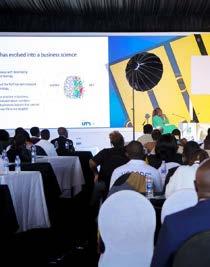
LAKE VICTORIA, ONE of the African Great Lakes with a surface area of almost 60,000km², was the stunning backdrop for the 2nd Annual African Marketing Confederation Conference, held at Entebbe, Uganda in early September.
The theme of this year’s gathering was ‘Africa’s $3.4 trillion Economy: Opportunities for Marketers’. This emphasised that, with a population of over 1.3-billion people and rich in natural resources, Africa is an attractive and still largely untapped market for marketers seeking exciting prospects.
Speaking during the opening plenary session, Uganda Marketers Society President, David Balikuddembe, said the conference aimed to showcase the potential of Africa’s vast market, providing delegates with valuable insights and tools to explore new business opportunities. The Uganda Marketers Society (UMS) was the official host for the conference.
He welcomed delegates from AMC member countries across the continent, as well as marketers from non-AMC member nations such as Tanzania, Ethiopia, South Sudan and
the United Kingdom.
In her opening remarks, Helen McIntee, President of the African Marketing Confederation, said the 2nd annual conference emphasised just how far the organisation has come since starting on a journey in 2011 to be an umbrella body for the continent’s marketing associations. There are now 10 country members of the AMC.

“Our aim is really to network, collaborate and upskill the marketing profession, as well as learn from each other in terms of how we’re dealing with the unique challenges that we have in Africa – and the unique solutions,” she stated.
MARKETERS MUST TAKE CHARGE
Among the keynote speakers was Professor Robert Ebo Hinson, Pro Vice-Chancellor of the Ghana Communication Technology University, who said it is concerning that African brands seem to be regressing in consumer esteem versus foreign brands operating on the continent.
Referring to a Brand Africa study published in April 2023, which emphasised that foreign brands are
increasingly admired by the continent’s consumers while indigenous brands are losing headway, Prof Hinson called for local marketers to take charge and sell themselves and the importance of their skills to the C-suite.
He believed marketers should be the glue for change in Africa by helping the continent’s businesses and brands to be data-driven, analytical and to properly integrate their operations by successfully using all the data available to them.
Prof Hinson emphasised that “the technology train stops for no one” and it is up to African marketers to embrace this, using technology to help measure the ROI of their marketing strategies, for example
“This is what the C-suite wants, we must be able to show how marketing is growing the business and growing sales,” he said.
TECHNOLOGY IS CREATING FUNDAMENTAL CHANGE
Embracing evolving technology was a key theme throughout the conference, with speaker after speaker noting the fundamental changes taking place and their impact on marketing.
Nondumiso Ngobese Mabece, Head of Consumer Marketing and PR at Multichoice Africa Holdings, speaking during a panel discussion on Media and Marketing Communications, said digital and data is helping DStv on a daily basis to deeply understand its customers and gain new insights.
“We monitor our figures daily across Africa; we know each market and how they are performing. Then we act accordingly. Marketers cannot be scared of figures or targets – those days are gone,” she stressed.
“Marketing must be indispensable and show value. We must display thought leadership within the business. We cannot wait to be told what to do; we must be leading.”
During a panel discussion on artificial intelligence, moderated by Lucia Musau, CEO of the African Elite Group in Kenya, delegates heard that AI cannot be

expected to think for marketers, who still need to direct AI’s actions according to the needs of the organisation.
›
AI cannot think for marketers
As one participant put it: “We must still have our marketing heads screwed on. If you don’t know what you need, how can AI help you?”
Delegates also heard that AI can be particularly effective in improving customer experience (CX), by scaling it and making it more feasible. AI has the advantage of being able to spot connections in raw customer data that human analysts may struggle to identify.
ACKNOWLEDGE LOCAL CULTURE
Speaking on day two of the conference, Pheodor Mundia, Head of Marketing for East & Southern Africa at Upfield, a global leader in plant-based foods, said even a strong and serious message can be brought home using local humour and local celebrities.
“If you don’t land your local culture in your campaign, you will fail,” he emphasised. “It’s not about whether you are a local brand or not, it’s whether consumers perceive you as being local. You must communicate with a local angle, but do it authentically.”
Mundia was addressing delegates on the topic ‘Culture as the New Marketing Currency in Africa’.


He explained that bringing authentic cultural messaging into a marketing campaign could include using local words, humour, clothing, cooking styles and even cooking utensils.
Even the pace at which a video or audio campaign is delivered to its audience can mark it as being authentic or inauthentic, as ‘pace’ differs from country to country in Africa. Similarly, it is important that campaigns originating from outside Africa avoid ‘me’ ideals and rather emphasise the collective values of family and helping others.
Mundia said respecting and acknowledging Africa’s many cultures must be a key element of achieving brand relevance on the continent. Without it, there is limited customer connection, because people prefer to tap into elements that they are comfortable and familiar with.

LEADING WITH BIG IDEAS
In a presentation on Leadership, titled ‘Growing Resilient People and Adaptive Leaders’, Yaw Nsarkoh, a former top Unilever executive now working as an advisor and investor in London, called for leaders to empower their brands through big ideas.
Like big revolutions, big brands are powered by big ideas and clarity of thought. For example, Nike’s ‘Just Do It’ positioning.
Produce worldclass thinkers
To create a revolution for the continent’s emerging brands, Africa must nurture its marketers for greatness, Nsarkoh underlined. “Global greatness, not just Ugandan greatness or African greatness. We must produce world-class thinkers in marketing from Africa.”
As an example of a leader’s ability to create significant change through a big idea that was able to deliver, he cited Chinese leader Deng Xiaoping’s economic reforms that rapidly lifted 800-million people out of poverty and transformed the country.
Another example is Steven Gerrard, former captain of Liverpool Football
Club, who almost single-handedly inspired his flagging team to come back from losing 3-0 at half-time to win the 2005 Champions League Final against AC Milan.
Calling it “optimism of the will”, Nsarkoh said marketers need to cultivate ideas and “go for it when things are difficult … and take your chances when they come”.
He concluded his presentation with a rousing call to action: “The African opportunity is for Africans to create. Nobody will come and do it for us. Never fear. Go for it!”
COMMON STANDARDS NEEDED
Discussing the state of the global marketing profession, James Sutton, Strategy and Commercial Director at the Chartered Institute of Marketing (CIM)
in the UK, called for the profession to become less fragmented. It should also have common standards similar to pilots, accountants and doctors.
Sutton said it is essential to avoid the silos in which the profession tends to operate – given that there are corporate marketers, marketing consultants, people who work in agencies, marketing educators, recruiters and others.
He added that it is also important for professional bodies, of which the CIM is just one example, to look beyond the profession in which it operates. “Their focus must be broader than that, it must be societal,” he explained.
Examining what is happening on the UK marketing scene, Sutton said expectations of what marketers should be able to do continues to grow. Given the increasing extent of these expectations, it is important for marketers to keep upskilling, and for institutions to provide the necessary learning opportunities.
“The CIM must try to meet all these upskilling requirements, which is usually funded by employers,” he noted.
“Artificial intelligence and sustainability are the two big areas where marketers want to grow their expertise, although digital marketing skills also remain in great demand.”
Attempting to answer the common question of whether AI is a threat to the marketing profession, he said the greater threat would be if marketers fail to adapt to what AI can offer them.
“But we must also stress that AI is not everything,” Sutton stated. “We must tell people, ‘If it’s not right for your business, don’t do it’.”
THE REBRANDING OF AFRICA
The importance of tourism to the African economy – and the most effective ways to market the continent’s attributes to foreign and intra-African visitors – came under the spotlight on the third and final day of the conference.

The theme ‘Rebranding Africa – One Country at a Time’ was discussed by: Dr
Matongo Matamwandi, Chief Executive Officer of the Zambia Tourism Agency; Toni Gumede, Manager in the office of the CEO of Brand South Africa; and Stephen Masaba, Director of Tourism and Business Development at the Uganda Wildlife Authority.
In his presentation, Dr Matamwandi emphasised that the continent must do more to market what it has to offer. For example, authentic African food is often better prepared in Dubai than within the countries of origin.
He called for “candid conversations” on what is holding Africa back and why there are bottlenecks in its rebranding.
Dr Matamwandi told delegates the obstructions include insufficient air links, overly complex visa regimes and border-crossing procedures, lack of reliable tourism data and statistics, challenging security conditions, inadequate infrastructure and facilities on tourist routes, a shortage of skilled workers, language barriers, limited awareness of tourism experiences in African countries, and insufficient private-public sector dialogue.
He recommended that governments collaborate on tourism strategies rather than competing, work together to set up infrastructure on cross-border routes, and have common standards for tourist facilities. Countries should also be easier to access.
Dr Matamwandi called for African marketers to set up a group of experts to help develop a continent-wide tourism marketing strategy.
This echoed an earlier call on day one of the conference by Professor Robert Ebo Hinson, who said the AU Digital Transformation Agenda could be the basis for developing a technologically inspired Brand Africa programme.
In her presentation, Toni Gumede, Manager in the office of the CEO of Brand South Africa, added her support for engaging with the African Union to build a successful Brand Africa strategy.
She emphasised that tourism branding should be ‘inside out’, with a focus on achieving buy-in from people and business within the country. “If [local] people are not happy with their tourism product, then you have already
lost half the battle,” she said.
Similarly, the study released earlier this year by the Brand Africa NPO, which shows African brands declining in popularity versus multinational ones, is worrying. “Nobody will believe in our products if we don’t believe in them ourselves,” Gumede stressed.
She told conference delegates that many smaller African businesses from different countries are already collaborating to sell themselves overseas. Nation brands within Africa need to do the same.
NEXT CONFERENCE HOST
During the conference proceedings it was announced that the Marketing Society of Kenya (MSK) will host the 2024 African Marketing Confederation Conference.

UMS President, David Balikuddembe, and Vice President, Sandra Arinaitwe, handed over the baton to the MSK delegation led by its Chairperson, Zuhura Ogada-Odhiambo, and CEO, Edward Oswe.

Not all work & no play
Delegates at the 2023 conference were able to spend some downtime networking and enjoying the company of their fellow marketers from across Africa. There was also opportunity to experience magnificent Lake Victoria and enjoy the excellent facilities at the Imperial Botanical Beach Hotel in Entebbe, located on the shores of the lake.
The Official Closing Ceremony and Awards Dinner on the final evening was held at the Ndere Cultural Centre in Kampala.



AMC award for MAZ pioneer
Honorary Membership of the African Marketing Confederation was awarded to Godfrey Johnson Dube. He is the Learning and Development Director at EDU Dynamics Business School in Zimbabwe, and one of the pioneers of the Marketers Association of Zimbabwe. He is a past president of MAZ and current Chairman of the Advisory Council of MAZ.
AMC Marketing Professional of the Year 2023 was awarded to Daniel Ogong, Executive Head of Marketing and Communication at Stanbic Bank in Uganda. Former Marketing Director of Nile Breweries, he is one of the most respected and influential business leaders in Uganda and the region.




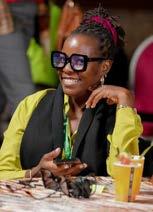

Thank you to our generous conference partners
The African Marketing Confederation and Uganda Marketers Society would like to thank the following partners for their generosity in making the 2023 Marketing Conference possible:


AfCFTA’s challenges and opportunities for marketers come under the spotlight

AfCFTA is a good news story of unity and positivity, which should be promoted within Africa and abroad. But systemic challenges must be addressed. By
 Cara Bouwer
Cara Bouwer
INCREASINGLY, MARKETING
organisations within Africa are turning the spotlight on the trade opportunities for African business being offered by AfCFTA and BRICS, and asking what role marketers can play.

Among these organisations is the IMM Research Hub, part of the IMM Graduate School. The latter is, in turn, aligned with the Institute of Marketing Management (South Africa), one of the founder members of the AMC.
Recently the Research Hub convened a webinar in which an expert panel analysed progress in implementing the African Continental Free Trade Area, and also how to leverage key global partnerships such as BRICS.
Dr Petrus de Kock, Coordinator of the MPhil Programme in Marketing and Co-Convenor of the IMM Research Hub, was the moderator for the webinar. He invited the panellists to critically engage with both challenges and opportunities, with an eye on the strategic issues impacting African societies, economies and businesses.
The AfCFTA has lofty ambitions to boost intra-African trade by around 60% by 2034 and, in the process, lift swaths of people across the continent out of

›
A‘Made in Africa’ label is planned
poverty. However, since its launch in 2018 it has been hamstrung by issues such as ongoing high import tariffs, the lack of harmonisation of regulations, and continued restrictions on the free movement of people across national borders.
Among the positive signs is that efforts are now underway to create an official ‘Made in Africa’ label for goods and services which originate from the continent.
Another piece of good news is that, in February this year, Botswana and Namibia reached a bilateral agreement on the free movement of people between the two countries; a move that is in line with the African Union’s visa-free initiative and Agenda 2063 (AfCFTA’s ‘Agenda 2063’ is a strategic framework for the socio-economic transformation of the continent over the next 50 years).
BRINGING PARTNERS TO THE TABLE
In terms of the implications for both
BRICS and AfCFTA, the webinar panellists were pragmatic about the issues and what is at stake if Africa does not seize this moment.
Looking at the BRICS summit – which took place in South Africa in August and saw Argentina, Egypt, Ethiopia, Iran, Saudi Arabia and the United Arab Emirates being added to the existing members of Brazil, Russia, India, China, and South Africa – Busi Mabuza, chair of both the SA chapter of the BRICS Business Council and the country’s Industrial Development Corporation, said it was important to find ways to embed trust, communication and cooperation. Mabuza explained that the efforts made by South Africans to speak the language and engage with the cultures of the other BRICS members could help to act as a bridge for the African continent and a route to market for the entire continent.
TIME TO RE-BRAND AFRICA
From a marketing perspective, the AfCFTA is certainly a good news story of unity and positivity which can be used to promote the entire continent. Recognising this, Helen McIntee, President of the African Marketing
› Sea trade within Africa must be seen as a lifeblood and a bridge between nationsConfederation (AMC), noted that the 10 national associations under the AMC banner have been engaging on brand marketing and re-branding Africa on the world stage.
“This is why it is so important that the AfCFTA really takes off,” she said, while recognising that rebranding Africa lies in the hands of individual marketers in each of the 54 nations.
“Zambia is doing some brilliant stuff in that they now have their border posts open 24/7 to allow for easier movement of people, ease of trade, and better supply chain operations. They’ve also dropped all visa requirements. And
Marketers can help to position Africa

that’s just one example.”
McIntee emphasised that, due to the complexities of operating in Africa, it was always essential to have highly skilled marketing professionals on board who understood the dynamics within the continent and how to position Africa on the world stage.
In this respect, it was becoming increasingly evident that African-based marketers had the edge over expensive
international marketing experts, who often battled with the intricacies and nuances of the various markets across the continent.
It was for this reason that McIntee felt the AMC’s recently launched Chartered Marketer Africa designation has such an important role to play.
“It will be the pinnacle pan-African marketing designation. We’ve had a lot of interest in it. It’s peer reviewed, so it’s a designation rather than a qualification. And if you get that pin then everyone knows you are truly a marketing professional,” she explained.
What also sets these top marketers apart is their deep understanding of the unique cultural and business needs across the continent, as well as the diversity among Africa’s people, noted McIntee.
WHAT TO FOCUS ON
This cultural awareness was a strong theme during the webinar, as was the tightrope marketers had to walk between business imperatives, the interests of the country in question, and politics.
It was impossible to ignore political issues when discussing complex
undertakings such as AfCFTA, the panel observed. Specifically, the interplay between governments and the private sector was a strong topic for discussion when it came to addressing Africa’s logistics and transport challenges.
Retired South African Navy Admiral, Robert Higgs, stressed that for countries like South Africa, Angola, Mozambique and Somalia, which have expansive coastlines, it was essential to harness sea trade as a “lifeblood and a bridge between nations”.
While East Africa had been focusing on ocean trade for some time, Southern Africa was lagging in this respect, despite the importance of sea routes for both the movement of goods and people. A concerted effort would be required of African leaders to capitalise on this geographic advantage, while also supporting landlocked countries such as Zambia, Malawi and Ethiopia, Higgs said.
Such an endeavour would be challenging but was a critical lever, added Elvin Harris, Chairman of the Chartered Institute of Logistics.
“If we don’t get the underlying infrastructure correct on transport and logistics, which includes the maritime side and IT networks, then we are going to struggle. All the other things are layered on top of the basic infrastructure – be it border crossings, railways or ports. And this is an area where Africa has struggled for a long time.”
Harris also stressed the importance of combatting the scourge of red tape. “Unfortunately the tendency of our governments is to overregulate or regulate the wrong things,” he observed, noting that Africa should harness the power of technology and artificial intelligence to streamline trade processes and develop the less sophisticated areas of the continent’s economy.
Of course, a logistics pipeline will have to be fed by exports from Africa, which the panellists noted must involve more than raw materials. Without a focus on beneficiation of resources and targeted manufacturing – specifically in
areas like motor vehicle production, pharmaceuticals and agro-processing – Harris warned that Africa “will never be a player on the world stage”.
Mabuza and Harris both noted the willingness of BRICS partners like China and Russia to support Africa’s beneficiation push as a means of adding value to the continent’s GDP while encouraging sustainable development and inclusive multilateralism.
CHANGING THE NARRATIVE AND ACTIVATING IDEAS

While the panellists spoke openly about the complex systems that needed to be put in place to enable Africa to fully capitalise on its BRICS connections and the promise of AfCFTA, there was an appreciation that partnerships could help – and this included with the African people. Here, said McIntee, marketers had a vital role to play.
Research out of the Centre for the Study of the Economics of Africa in 2020 showed that 60% of Nigerian businesses had never heard of AfCFTA, despite advantages to Nigeria’s economy from gaining access to the rest of the African market. Getting large and small businesses in key markets like Nigeria excited about the potential was crucial.
“There is marketing job to be done there. We need to market the AfCFTA and the agreement before we can start to implement,” was McIntee’s takeaway. “Maybe that’s why we aren’t getting anything done, because people don’t understand what it is trying to achieve.”
TOURISM IS AN INSIDE JOB
Speaking during a subsequent IMM South Africa online Flash Talk that also discussed AfCFTA, Zambian-based tourism expert Mulemwa Moongwa said the pandemic’s damaging impact on inbound tourism to Africa, whether for business or leisure, had emphasised the need to look within Africa for visitors. Other African countries could, indeed, be viable source markets for tourism industry marketers.
“It’s important to make the most of what we have,” she emphasised. “We have never looked at ourselves as tourists; we’ve always looked abroad. So we must think about how we package ourselves to other African markers.”
To benefit from the momentum of AfCFTA, Moongwa said the continent’s tourism marketers needed to show unity of purpose and be prepared to market Africa as a whole, or specific regions, rather than being fearful that this would detract from their own tourism product.
Cara Bouwer is a Johannesburgbased writer, journalist and editor. Her words appear in media articles around the world, in business case studies, insight reports and corporate copywriting. She is also an experienced ghost writer. @carabouwer
Additional reporting by Mike Simpson.
WASHINGTON SUMMIT DELEGATES TOLD OF A f CFTA’S POTENTIAL
African marketer and young leader, Tarisai Moffat, highlighted the significance of AfCTA as a beacon of hope for transforming the continent’s economy when delivering an Ignite Talk at the Mandela Washington Fellowship Summit 2023 in Washington DC recently.

Moffat, the owner of Gateway Synergy marketing agency, was in the US to participate in the Mandela Washington Fellowship Program at Jackson State University. The programme is part of an initiative by the US government to foster international relationships and enhance skills.
She told delegates that AfCFTA had to reduce or eliminate restrictive trade laws and transportation issues which were hindering Africa’s potential for growth and success.
However, she emphasised that waiting until Agenda 2063 is not
an option, and tangible change must be implemented now for the betterment of future generations.
A FRAGMENTED LANDSCAPE
“Trading from Ethiopia to Nigeria, for instance, involves traversing multiple borders laden with customs duties, taxes, licenses and certificates. The ensuing fragmented trade landscape inflates goods’ costs, rendering them unaffordable for consumers and businesses alike,” Moffat explained. She noted that a seemingly reasonable US$150,000 invoice could incur an additional US$100,000 in transportation costs, significantly exceeding market norms. These bottlenecks thwart business growth and challenge marketers who painstakingly study consumer preferences, only to encounter delays or elevated costs in product delivery.
In her presentation, Moffat vividly depicted these challenges, citing a Kenyan battery consignment under AfCTA that took six weeks to reach its destination due to a complex shipping route.
As the marketing landscape evolves rapidly, with online deliveries setting new expectations of swift turnaround, these trade hindrances were growing more pronounced and hampering market growth.
“This underscores the interdependence of streamlined trade, vibrant economies, and successful marketing strategies,” Moffat said.
Marketers, representing both consumers and traders, share the responsibility of advocating and marketing the merits of free trade, she believed.
Readers of our Digital Edition can view her Ignite Talk on YouTube here
The Uganda Marketers Society is the leading community and voice of marketing professionals in Uganda. We are responsible for professional skills development, promotion of professional marketing standards and practices.


Our Vision
To be the leading body of marketing practitioners and professionals inspired towards the development, promotion, and application of world-class marketing leadership.
What we do Membership
Professional skills development
Promotion of professional marketing standards
Market research and consultancy

Events and networking opportunities
We are a membership body. We have individual and corporate membership packages.
To become a member, send an email to admin@ums.co.ug

Email: admin@ums.co.ug
T el: (256)787433057
Multinationals are increasingly localising their African supply chain strategies

Supply chain unpredictability, fears of tough Chinese lockdowns, and foreign exchange volatility drive the likes of Nestlé and Unilever to source locally.
FOOD AND DRINKS company Nestlé is among several multinational businesses operating in Africa that are implementing strategies to localise key production and raw-materials sourcing.
The aim is to reduce increasingly expensive imports, decrease exposure to the currency volatility in many African countries, and combat the global supply chain problems that have yet to abate following the pandemic.
Nestlé’s Egyptian operation, for example, recently added four new production lines to its existing facilities.
By Mike SimpsonAccording to the Chairman and CEO of Nestlé Egypt and Sudan, Tarek Kamel, three of the new production lines are for food products, while the fourth is for dairy products. The first food line will begin operating in December 2023.

This strategy will not only help Nestlé to meet the growing demand within the country, but also help to position Egypt as a potential export hub for Nestlé products to other markets in the region.
“Nestlé has a long history of operating in Egypt, and this expansion underscores the company’s commitment to the Egyptian market’s
potential,” the publication Food Business Africa reports.
“The company has maintained a strong rapport with Egyptian consumers by delivering high-quality products that cater to local tastes and preferences.
“With the addition of these four production lines, the company is poised to continue its journey of delivering innovative and sustainable products to consumers across Egypt and the broader MENA region.”
SOUTH AFRICAN PRODUCTION
In South Africa, Nestlé recently unveiled a new US$4,4-million manufacturing plant near the city of Pretoria. By producing locally, the company said it would streamline supply chain operations, reduce environmental impact, and ensure fresher products for consumers.
The facility uses 46% locally sourced raw materials and Nestlé says its aim at the Hammanskraal plant is to achieve 90% local materials sourcing. Most production is targeted for South African consumption, with a small percentage going to other African countries or further afield. Previously, many of the products were sourced from Asia.
According to Nivasha Pather, the company’s Marketing Manager for Nestlé East and Southern Africa (known as ESAR), the launch of the
coffee mixes plant solidifies Nestlé’s commitment to industrial development and investment in the region, as well as its commitment to cater to consumers’ evolving needs.
“We are excited to officially open our coffee mixes manufacturing plant and demonstrate our dedication to the local market,” said Carl Khoury, Business Executive Officer, Coffee and Beverages, at Nestlé ESAR in a media statement.
“The importance of revitalising South Africa’s manufacturing sector, including its contribution to the economy and export promotion, is emphasised in key national policies such as the Reconstruction and Recovery Plan.

“We take pride in our investment in this production plant as it reflects our dedication to nurturing the potential of the region and contribution to rebuilding the economy.”
CHANGES IN NIGERIA TOO
In June, news agency Reuters reported that Nestle’s businesses in Nigeria and other African countries have ramped up sourcing of local raw materials like starch and turmeric in “a move that may help reduce foreign exchange exposure that has been a headache for the sector”.
Reuters quoted a company spokesperson as saying the next step
is to expand “the localisation journey across the region [to] Cote d’Ivoire, Cameroon and Senegal”.
Nestle said it was working to develop local suppliers of vegetables and spices used in Maggi products – for instance onion powder in Nigeria and Senegal, and turmeric powder in Nigeria.
“In the area of grains, we have successfully developed local farmers and processors ... this has been achieved through (a lot of) training in good agricultural practices, harvesting, warehousing and cleaning practices.
“We are now taking this next step to introduce these farmers to regenerative agriculture as part of our sustainability journey and commitment.”
According to Reuters, Nestle’s sales from the Middle East and Africa grew about 6% to US$5.9-billion last year, accounting for about 6% of group annual sales.

Unilever, meanwhile, is another big name that is increasingly using African-based suppliers, including local farmers, to provide the raw materials it needs. Previously, many of these would have come from Asia.
“Over 95% of the brands we sell to our (African) consumers are made in African factories,” Reginaldo Ecclissato, Unilever’s Chief Business Operations and Supply Chain Officer, told Reuters in an interview published in May.
“But, until quite recently, we could only source under a third of the inputs we need from within Africa.”
He said buying local allows for closer supplier partnerships, shipping savings and a reduced carbon footprint. Importantly, it also reduces the foreign exchange required to pay for imports.
Today more than two-thirds of the ingredients that go into Unilever products sold in African markets come from the continent.
In particular, it is ramping up sourcing of sorbitol and spices – which were previously imported from India and China – from suppliers in countries including South Africa and Nigeria.
Danone, the French-based foodproduct multinational, is another that is reported to be going the same route. While Danone declined to comment to Reuters, the news agency quotes Pierre-André Térisse, a former Danone executive who ran the company’s Africa business from 2015 to 2018, as saying: “What is happening in China is pushing people to find alternatives … That’s an opportunity for Africa.”
Local sourcing is being increased
Business lessons from a Kenyan retailer selling from an open cart
How closing his unprofitable small food stalls and opting for a hawker’s cart proved a game changer for a bold informal trader.
THE MAGIC OF A MKOKOTENI
What’s the magic of having a mkokoteni, rather than two street stalls? Koome explains:
• By using the car t, he doesn’t wait for customers to come to his shop, but instead goes to the customer, which results in higher footfall. In other words, he is a hawker.
• End consumers perceive fruits and vegetables sold from mkokoteni as always fresher and cheaper, compared to products sold in street stalls.
• Using the mkokoteni allows the informal retailer to stock fast-moving products with low value and high margins, since he no longer has fixed customers.
“I remember asking him, ‘how many crates of tomatoes do you sell on a bad day?’ His answer was ‘I no longer have a bad day, unless I want to have one’,” says Koome.
“Key takeaways from this inspiring vendor: Always be innovative and quick to adapt to market and customer needs!”
FROM KENYA’S VIBRANT
informal trading sector comes a story of an inspiring vendor who is living an important philosophy for retailers of any size: always be innovative and quick to adapt to market and customer needs.
John Koome, until recently Regional Sales Manager at Twiga Foods, the B2B marketplace platform that sources produce directly from farmers and delivers it to retailers, tells of an unnamed customer who operated two small informal food stalls (known as ‘vibandas’).
Twiga used to deliver one crate of tomatoes for each shop daily. However,


the business struggled and the customer found he couldn’t keep up with the fixed costs of rent and wages.
So he closed the stalls and bought a two-wheeled open cart, known locally as a ‘mkokoteni’. This proved a game changer for his business.
Previously, he sold a total of two crates of tomatoes daily at the two shops. But now, using the mkokoteni, he sells an average of five 22kg crates daily.
The margins for fresh produce are good, and the informal retailer now makes over Kes 2,000 daily (US$14) in profit from just his tomatoes, which equates to Kes 60,000 (US$420) monthly.
Koome tells another story of an entrepreneur who manages four mkokotenis, each specialising in trading different products like tomatoes, potatoes, ripe bananas, and an assortment of products.
Selling an average of 1,000kg daily, the trader rakes in Kes 5,000 (US$34) to Kes 7,000 ($48) in profits per mkokoteni every day.
“These hawkers are a shining example of the incredible potential in the world of small-scale businesses. They are not only contributing to the retail industry, but also leaving a positive impact on their community,” says Koome.


The problem with global brands importing strategies for local audiences

Given growing recognition of the continent’s creativity, Emeka Ezeagu wonders why many global brands still develop their campaign strategies outside Africa.

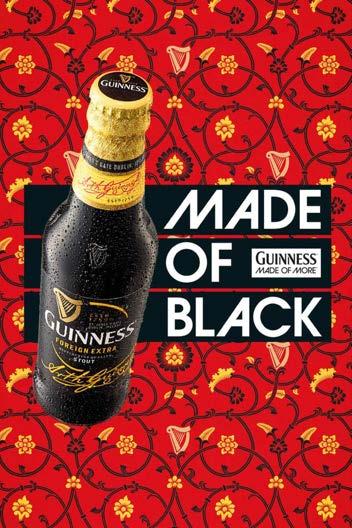
› When Guinness attempted to define what it means to be ‘black’ to a Nigerian audience, did it get a reply of unbridled nonchalance?
The Guinness Michael Power campaign became one of the best-known alcohol advertising campaigns in Africa

CANADIAN RAPPER
Drake used the Nigerian slang words ‘ikebe’ and ‘bakassi’ in the song ‘Won’t Be Late’, in which he collaborated with American rapper Swae Lee – and I have never stopped wondering what the implications were.
For example, were those words censored on international radio, like in Nigeria? Did foreign radio stations censor words they would otherwise have censored if they were said in English? Did they even know the words meant ‘ass’ or, more politely, ‘buttocks’?
Nevertheless, it was yet another instance of how far Africa has moved elements of her culture to a broader audience. Fifteen years ago, it would have been inconceivable for Drake, a renowned international recording artist, to know a Nigerian slang, let alone use it in his music.
Today it’s much different. Africa is growing up. And her creativity has exploded over the past few decades. This growth owes much to indigenous peoples finding renewed ways to tell and present the African story with little regard for external acceptance or interpretation. As the locals embraced it, the world learned more about it.
With such a rise in popularity, reach and reception of African creativity, one often wonders why global brands still source their brand campaign strategies from outside our shores.
It is a practice that has been used to varying degrees by some of the world’s biggest brands. It is a revolving door, complete with reward systems, that go something like this:
• A global brand comes up with a global strategy they think will resonate with the African audience.

• They ask a partner agency or cultural collaborator to localise said strategy.
• They take the product to market based on the strategy.
• They are rewarded with many marketing awards, given by people who need more understanding of the African market.
In all this, the question of how well the campaign connects with the local audience is given little attention.
Perhaps the most glaring testament to this was the audacious effort by Guinness in 2014: the strategy to contextualise ‘black’ for the African audience with the #Madeofblack campaign. To Guinness, black was an attitude. But more than that, it was a clever pun that invariably tied the brand’s definition of the word to the appearance of the product and the predominant colour of the target audience.

Like most global brands, Guinness identified an attribute unique to local audiences. Still, the journey from identifying a need to finding a sound, locally relevant strategic insight is long and arduous. Even more so when people whose foreign-based lived experience is far removed from the markets they are trying to influence, lead the search for this insight.
Guinness might have been forced to relook the campaign if it had the simple understanding that many Africans do not revere their ‘blackness’ as a core attribute of their identity, or even consider it.
NO LENS OF RACIAL IDENTITY
A Nigerian, for example, does not view himself through the lens of collective racial identity but through a cultural, tribal and individualistic one. In its struggle, perhaps the African diaspora has been forced to find meaning in a collective racial identity owing to years of racial strife perpetuating the ‘other’.
Unlike the African diaspora, however, our melanin dispensation is the unscathed part of our story. We are coloured people in coloured communities, with coloured friends, acquaintances, neighbours and foes – troubled more with a poised, systematic erosion of cultural identity than with centuries of race-based dehumanisation perpetuated by a visible ‘other’.
Thus, we are conflicted, not with the historical weight of our ‘blackness’ and the meaning thereof, but with more pressing concerns like our economic and cultural unravelling.
Put plainly, our experiences at home differ vastly from that of the African diaspora, despite our alliance on the colour wheel. Hence, the incentive to frame our identity through a collective racial lens is diminished.
So much so, that when Guinness attempts to define what it means to be ‘black’ to the Nigerian, it gets a reply in unbridled nonchalance.
But the originators of the #Madeofblack campaign did not know this. How could they? They did not understand our blooming cultural dynamic or communal and societal pain points.
They knew one thing, though; we are black. Therefore, pandering to that immutable characteristic must hold immense sentimental value and connect on a deeper level. But it didn’t!
Therein lies the problem with cloning Western ideals of the African experience for African markets.
The partner agencies often lack the encouragement and financial sway to challenge the premise of a localised
strategy, no matter how flawed and ineffectual said strategy is.
More so, the idea of a partner agency becomes sub-optimal if they work within the boundaries of a preconceived global strategy. No matter the input, a localised strategy carries a different weight than a strategy organically mined by people who are living and breathing the local culture every day.
For example, how would the global strategist know that ‘chairman’ means something entirely different in Nigerian parlance? (It’s a term used to describe a normal guy).
Or that ‘how far?’ isn’t a question that indicates distance in Ghana? (Rather, it asks what you’re up to).
ENGAGING LOCAL EXPERTS CAN ENHANCE A GLOBAL STRATEGY
Engaging local people to refine a preconceived brand strategy is not to say there is always a flaw in the original concept. It is simply to recognise that a Mexican is more likely to make a tasty taco if the centuries-old traditional recipe is not watered down by a Brit.
While all global campaigns localised for African audiences do not do poorly, the tenet of what makes a successful one rarely changes: the focus on culture, tribe, or individuality.
Consider another campaign by a global powerhouse. Coca-Cola’s ‘Share a Coke’ campaign, like Guinness’ #Madeofblack, was conceived outside the shores of Africa. But unlike ‘Made of Black’, the campaign thrived on its appeal to the individual.
Indeed, focusing on the individual doesn’t have to negate the possible impact of appealing to the African collective. The issue lies in the flawed lens through which our collectivity is gauged and engaged.
Africa is not immune to the appeal to the individual. Indeed, it may be the
safest bet for global brands to hinge their marketing strategies on.
The imported strategies that do well across markets here in Africa lean heavily on shared human truths like individuality instead of ill-conceived racial abstractions.
Share a Coke and Guinness’ Michael Power campaign are great testaments to this.
For those unfamiliar with the latter, Michael Power was an advertising character (played by Cleveland Mitchell), the cornerstone of a large marketing campaign by the beer company to promote its products in Africa from 1999 to 2006. By 2003, it had become one of the best-known alcohol advertising campaigns in Africa and the BBC referred to Power as “Africa’s very own James Bond”.
If global brands continue to localise global strategies, they must, at the very least, resist the urge to speak to the African consumer as a collective, racial entity.
Better still, global brands must evolve their perspective on partnerships with local markets to aid collaboration from the onset, so that the conversation goes from localising a strategy to co-creating a sound, locally resonant strategy. Indigenous peoples must lead this effort.
GIVE YOUTH ITS HEAD
Even if we disregard the sentimental incentive to let Africa’s people tell her story, there’s an economic incentive too. The reinvigoration of the rapidly growing African youth population is reflected in the emerging sectors generally controlled by young people – such as fintech, fashion and entertainment.
The continent’s young people want to explore uniquely Afro-centric solutions to solve uniquely African problems. Their view to problemsolving is to look inward for solutions to internal problems.
Less than two decades ago, African nightclubs primarily played Western
A tasty taco is best made by a Mexican
Captain Morgan, the rum brand owned by international alcoholic beverages giant Diageo, recently launched its debut homegrown pan-African campaign called ‘Spice On Africa’. Initially launching in Kenya and South Africa before being rolled out to Nigeria and markets across the continent later this year, the digitalfirst campaign includes a hightempo 45-second TV commercial, accompanied by social and digital edits.
The campaign is also appearing in out-of-home and on-trade and off-trade retail channels.
Captain Morgan’s video campaign features talent from Kenya, Nigeria and South Africa, and was crafted by creative agency RPM.
The advert features Nigerian afrobeats singer Yemi Alade’s ‘upbeat’ track Baddie, and is voiced by South African comedian Mpho Popps, and music artist Barak Jacuzzi of Kenya.
RPM worked with acclaimed director Kyle Lewis and South African production company, EGG films from Cape Town, to bring the creative to life.
“The new ‘Spice On Africa’ campaign is the first pan-African campaign we’ve seen at Captain Morgan and highlights our commitment to growing the brand in the region,” says Samori Gambrah, Global Brand Director at Captain Morgan.
“Spice is what makes Captain Morgan delicious, but it’s also an attitude – and this campaign is all

about celebrating those who bring their unique ‘spice’ to the party. I’ve loved working with our Captain Morgan teams and creative talent across Africa on this campaign.”
Lesibane Mohale, Senior Creative at RPM, says the vibe and energy on set was very special.
“With the cast coming from Nigeria, Kenya and South Africa, an amazing crew and our director, Kyle Lewis, this exciting production was a melting pot of diverse talent and unique cultures coming together.
“We wanted this campaign to connect with our audience by showcasing the warmth, vibrancy and spirit that can be found across this incredible continent, and it was a spirit that could be found on set.”
music, and fintech solutions were largely outsourced to foreign players. All that has been changed by the African youths’ desire to find solutions within Africa.
It is this youth cohort that brands would need to speak to in the future and, barring a paradigm shift, the habit of replicating Western ideals of the African experience would risk turning off a large swath of this audience.
In his book ‘Africa: Altered States, Ordinary Miracles’, African journalist
and author Richard Dowden captures the historical perspective of the Western effort to carve the African story.
He writes, “Africa played no part in creating their nation-states. Their boundaries were drawn on maps in Europe by Europeans who had never been to Africa, with no regard for existing political systems and boundaries.”
Thankfully, we are a continent of storytellers whose cultural evolution is as rapid as the sheer growth in
Author Emeka Ezeagu
Cultural, tribal, and individualistic identities are more likely to be relevant to many Africans than a racial identity
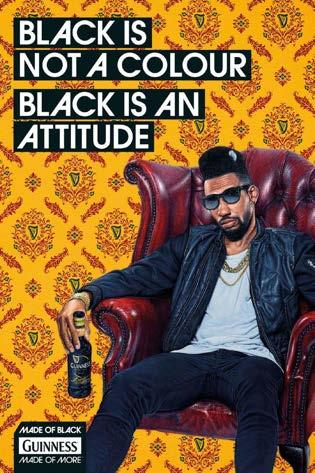
Africans must take the lead in telling their own stories
numbers of people itching to tell it to a global audience.
Marketing for Africa, by Africans, presents another platform for Africans to take charge of our story, especially now that Africa has found a new swagger in expressing and exporting her cultural identity. She should, therefore, lead the telling of her own story.
As a passionate designer and skilled wordsmith, Lagos-based Emeka Ezeagu blends creativity with written expression. With a keen eye for visual aesthetics and a love for storytelling, he crafts engaging narratives that aim to captivate readers and offer a unique perspective. You can find him on X (Twitter): @byornironsidee.
Our Vision What we do




Marketing teams and their agencies must act swiftly to capitalise on newsjacking opportunities as they emerge
When topical news stories become a brandbuilding opportunity
The immediacy of social media and the 24-hour news cycle makes newsjacking a viable marketing tactic. But beware of the pitfalls. By George Damson.

IN HIS BOOK TITLED
‘Newsjacking’, the renowned American strategist David Meerman Scott described it “as the process of adding your thoughts and opinions into breaking news stories”.
Think of it simply as riding on the back of trending news topics to get yourself noticed. He coined this term around 2011 and, in 2017, the Oxford Dictionaries shortlisted it for the Oxford Word of the Year.
Since then, newsjacking has become an increasingly popular tool and tactic, especially in marketing. But it has come with its own perils, with critics labelling marketers who default to newsjacking as lazy, unimaginative and lacking in creative originality.
We live in a world where a lot happens every minute. There is such a deluge of content from various sources that it is tempting for marketers, in particular, to piggyback on a ‘hot topic’ for their brands.
POTENTIAL FOR BRAND RISK
The danger, though, is that many marketers do not seem to understand that newsjacking is an art and, if used correctly, can deliver results. But, if done haphazardly, it is merely a risky waste of time and resources.
Most brands use newsjacking to build brand awareness and increase traffic to their social media pages and websites – although in Malawi it is usually done on Facebook only.
I have yet to come across a local brand that newsjacked a topic and had it take me to the brand’s website as a way of promoting traffic to the site. This is because most of the newsjacking is substandard. It is basically an image and copy, with nothing that leads the consumer somewhere relevant.
Since newsjacking is about real-time stories developing and happening in real time, you must determine the approach that will best get you the attention you desire.
Often, brands resort to quick adverts as a form of newsjacking. But I have

seen few examples where this has been done effectively, and in a way that fits the brand’s persona and resonates with the target audience.
This can perhaps be forgiven if one considers the time and bureaucracy involved in getting anything approved in most large organisations, which makes timely commentary on a trending news topic difficult to achieve.
IDENTIFY A SUITABLE TOPIC
The first priority in newsjacking is to identify a topic that is newsworthy. It does your brand little good to be jumping onto every trending topic, simply because there is noise around it.
There are many minefields that you can walk into if you are newsjacking out of excitement and without paying
Newsjacking opportunity at the Rugby World Cup
An example of an African brand embracing newsjacking to the full emerged during the 2023 Rugby World Cup in September.
The South African team, known as the Springboks, is famous for its dark green and gold-trimmed kit. But, for this tournament, a mintgreen and white kit was introduced as part of an initiative to help visually impaired fans.
Many people were dismayed and pointed out that the new design and colour scheme closely resembled that of Checkers Sixty60, a popular grocery e-commerce platform. Social media users produced a flood of memes poking fun at the kit and its
claimed connection to Sixty60.
Checkers quickly embraced the opportunity and produced a video campaign showing the alleged kit ‘designer’ telling a colleague he has no idea where his inspiration for the design came from. The camera then follows the ‘designer’ into his office and we see him surrounded by packets of Sixty60 groceries, Sixty60 children’s toys and sitting on a Sixty60 plastic toy delivery motorcycle.

The payoff line from Checkers is: “It wasn’t us…but it may be our fault.”
The video attracted 140,000 views on YouTube on its first day.
Readers of our Digital Edition can watch the video here
attention to potential backlash. Issues around human rights, discrimination and political sensitivities must all be considered before you decide to go newsjacking.
Sometime last year, a few Malawian brands tried to newsjack an issue that was trending on social media. It was largely a private matter between two individuals and was badly timed and bordered on cyberbullying.
It forced the Institute of Marketing in Malawi to release a press statement warning the concerned brands to recall the adverts and apologise to the affected parties. In a country with alarming suicide rates, there was a genuine concern that what was being said could have driven young people to commit suicide.
It therefore becomes of the utmost importance to understand that whatever newsjacking topic you decide to focus on must fit your overall brand purpose.
IS IT A GOOD BRAND FIT?
Newsjacking without paying attention to brand fit can result in reputational damage. It can also cause a loss of identity, as your customers may start asking if you really know the purpose of your brand (very dangerous territory).
Equally critical is deciding if you are going to use newsjacking as a longterm strategy or a one-off tactic. You can create a lasting impact with one well-placed newsjacked item, but that does not mean you need to do it over and over again.
The issue of brand purpose is once again key here. If you are to use newsjacking long term, it requires planning and preparation – just as you would with any other element of your brand strategy.
While you cannot predict what will happen in the news and current affairs environment, or when it will happen, you do need to be prepared for how you will respond. Nando’s, the famous South African-born fast-food chain, is one of the masters of newsjacking in Africa.
Nando’s marketing team does it in such a way that it speaks to their core purpose, promotes their brand and, for good measure, is actually funny.
They also ensure that whatever they have newsjacked is based on something their target audience identifies with. There is no point in newsjacking an issue known only to you and your marketing team, then assuming everyone else is going to know what you are talking about.
When Uber told customers: ‘Please don’t ride’
The global pandemic produced many newsjacking opportunities for brands. One of them was Uber, the renowned ride-hailing app. Despite its business proposition being based on moving people quickly and easily from A to B, the Uber marketing team and its agencies produced a counterintuitive campaign that urged people not to go anywhere and thanked them for ‘not riding’.
“Our message with this campaign is pretty simple: Stop moving,” explained Thomas Ranese, VP of Global Marketing at Uber, when the campaign launched in early 2020.
“We felt it was particularly relevant for a company whose brand stands for movement to reinforce this important message. And we don’t think you can repeat it enough.”
Readers of our Digital Edition can watch one of the Uber video ads here

that even if others jump on the bandwagon, you set yourself apart. Giving flexibility to your in-house marketing teams, or the agencies you work with, helps with newsjacking because you can act quickly and decisively when necessary. How quickly are you going to post on Facebook, Instagram or X (formerly Twitter)? Timing is king in newsjacking.
While social media provides obvious newsjacking opportunities, some campaigns are also suitable for traditional media
DON’T FOLLOW THE CROWD
Another important aspect to note is that newsjacking loses its impact if you follow the crowd. Several times in Malawi, I have seen five or more companies doing the same thing at the same time.

This is a nonsensical approach to newsjacking, and there is absolutely no benefit to your brand. If you are to newsjack successfully, you must lead the conversation and do it so effectively
Newsjacking has undoubtedly grown in popularity over the past few years, driven by the instant nature of social media and the modern 24-hour news cycle. But it is not something to be entered into blindly, and requires careful planning and consideration. You cannot afford to find yourself in the eye of a storm and facing a backlash from your target audience, just because you failed to make wise newsjacking choices.
George Damson is the Managing Director of Blitz Interactive Agency, a Malawian brand communication agency. He is also the current Vice President of the Institute of Marketing in Malawi. A version of this article appeared in the IMM E-Magazine, the official publication of the Institute of Marketing in Malawi.
Bread brand gets a boost as little girl’s cute photos go viral

Social media users create their own mock marketing campaigns and call for charming three-year-old to become a brand ambassador.
ALBANY BAKERIES, A South African bread brand, received an unexpected boost recently when a series of photos taken by an aspiring photographer of his three-year-old niece went viral on social media.
Cute-as-a-button Lethukukhanya Mjaji was photographed in various poses with a loaf of Albany bread as part of a university project by her uncle, Lungisa Mjaji.
He told the newspaper TimesLive he wanted to capture the essence of South
Africa and its love for children, as well as include well-known products.

“I saw an opportunity to involve Albany, a well-known bread brand, and decided to incorporate it into the shoot,” Lungisa said.

He shared the photo and video sequences on social media and they became an instant hit. On X (formerly Twitter), there were more than one million views and almost 8,000 shares. On TikTok, there have been more than 8,000 shares and over 214,000 likes.
The ensuing frenzy, which included
people creating their own illustrations and mock-ups of how the photos could be used in marketing campaigns, once again emphasised just how quickly – and widely – an apparently innocuous social media post can spread. Many people also urged Albany to adopt the little girl as a mini-brand ambassador.
Subsequently, Albany shared Lungisa’s TikTok video on its Facebook page and Albany representatives visited the young girl’s family to hand over various Tiger Brands products to them. Tiger Brands is one of Africa’s largest FMCG
manufacturers, with Albany being part of its brand portfolio.
In a statement to Strategic Marketing for Africa, a Tiger Brands spokesperson said: “Albany was heartened by the beautiful image of a young girl captured by her uncle, photographer Lungisani Mjaji, which told a heartwarming story in just a moment of how bread runs can turn into unforgettable moments.

“We were honoured to gain permission from Lungisani to organically reshare the video on our social media platforms so that more people could experience this moment in a time when we all need a little upliftment.”
In response to our question as to whether young Lethukukhanya would feature in any future marketing campaigns, a spokesperson said there were no plans to do so.
“Our responsible marketing policy seeks to ensure that all our marketing and communication reflects our commitment to fair and responsible marketing practices, with specific guidelines around the portrayal of children to ensure their rights are protected.”
›
Brand’s response was instant and genuine
In a LinkedIn post examining how the images went viral and their subsequent impact, Sibongile Erica Mbuzwana, MD at Valiant Agency, an SA-based digitalfirst agency, said the brand’s swift response and genuine engagement transformed what could have been a passing viral moment into a genuine connection with its audience.
She provides five key tips for fostering brand love in the age of social media:
• Embrace Authenticity: Be true to your brand values.
• Act Swiftly: When a positive moment arises, act promptly.
• Listen and Respond: Pay attention to what your audience is saying.
• Create Emotional Connections: People connect with brands that stir up emotions.
• Give Back: Show your appreciation and give back to your audience.
Albany Bakeries has been in existence since 1970 and, as part of the giant Tiger Brands group, operates 12 bakeries around South Africa and a fleet of 1,200 delivery vehicles.
It recently introduced a refreshed brand positioning strategy, supported by an extensive throughthe-line campaign.
“In a category where there is little differentiation between brands, Albany has slightly turned things on their head by acknowledging that life is not meant to be perfect and in these imperfection moments, relatable joy can be found,” Tiger Brands explains.
“The new campaign showcases everyday shared situations such as load shedding (scheduled power cuts) messing up dinner, waiting desperately for payday, or being friend-zoned – all situations where Albany is the perfect bread for an imperfect world.”
Readers of our Digital Edition can see the TikTok video shared on Albany’s Facebook page here, access photographer Lungisa Mjaji’s X (Twitter) page here and view a TV commercial for Albany’s new brand campaign here.
› Companies must not cede the customer experience to bots designed to extract value in the short term

Can AI and chatbots really deliver customer service excellence?
Organisations must harness the power of AI to free up their people to do what no robot can do – truly connect with customers.
By Nathalie Schooling.YOU WOULD BE HARDpressed to find a place today where you are sheltered from the discussion around the endless potential of artificial intelligence and the role it can play in shaping society.
The world over, companies are beginning to feel the pressure to get AI-ready and be seen as innovative and tech-forward. But it’s important to be able to discern the functionality from the hype.
From a customer experience perspective, AI, chatbots and other tech advancements can be incredibly exciting. When it works well, it’s an advantageous enabler. The problem, however, is that it doesn’t always work well.
When looking at the current customer service options available, it can be narrowed down to four basics: human interaction; self-help; online forum; or chatbots.
A study we conducted in February this year for our business revealed that 85% of the people found the best service from human interaction, 14% from self-help and FAQs, and only 1% enjoyed interacting with chatbots. These results are not surprising, given that customers are human beings who desire authentic human interaction.
While AI might be efficient and to the point, its biggest downfall is that it lacks an understanding of human emotion. AI cannot empathise with what we, as customers, are experiencing because it has no frame of reference.
At best, it can simulate what it has learned through programming. And, while a bot may be able to use language that mimics compassion, the responses are not authentic and human beings are acutely aware of this.
When you type the following question into ChatGPT: “What role will AI play in customer service?”, the answer is as follows:
can be critical in resolving customer concerns.” (OpenAI’s GPT-3 session accessed 7 February 2023).
WHY HUMAN INTERACTION WILL TRUMP THE CHATBOTS
There appears to be a resounding consensus that emotional intelligence is one of the main limitations of AI in delivering a great customer experience.
It’s for this reason that I believe customers are often left with feelings of frustration after dealing with automated services – because the AI just can’t contextualise understanding, enough to empathise with a customer.
“It is possible that AI may play a larger role in the customer service industry in the future. AI-powered chatbots and virtual assistants are already being used by many companies to provide customers with quick and convenient access to information and support. These tools can handle simple, routine tasks and inquiries quickly and efficiently, freeing up human customer service representatives to focus on more complex and nuanced issues.
“However, it is unlikely that AI will completely take over the customer service industry in the near future. While AI can handle simple and routine tasks, many customer service interactions involve complex issues that require human empathy, intuition, and problem-solving skills. AI also lacks the ability to understand the emotional context of a situation, which

There’s also a cap on just how well the bot can problem-solve, because problem solving very often requires creative thinking. AI can only offer solutions within its current toolkit and just isn’t equipped to handle anything unexpected, or tackle customers’ queries that are out-the-ordinary.
This leads me to the question on everyone’s mind. How far are we from having customer service be completely replaced by AI? Many experts assure us that this will not happen anytime soon, if ever. Forbes business magazine comes down on the side of it augmenting and automating, but not replacing.
Harvard Business Review also emphasises that AI should play a support role to human interactions with customers and stresses that managers should not use generative
PHOTOS: ADOBE STOCK; PAVEL DANILYUK FROM PEXELS; PIXABAYNuanced issues need a human
›
AI technology “only to cut costs and improve efficiency”.
It adds: “Less appreciated is the risk that companies will cede the customer experience to models and bots designed to extract value in the short term, not to foster long-term customer loyalty … If we are not careful, profitseeking bots, algorithms, and predictive models could indeed lead to dystopian experiences.”
NOT ALL DOOM AND GLOOM
With all the negative feedback on AI in CX, one can argue that chatbots and AI have no place in the customer experience journey.
But this is not true. AI, when used correctly, can not only enhance the customer experience, but can also save companies money. According to another article by Forbes, published in May this year, it’s possible for up to 80% of basic client queries to be correctly addressed with AI chatbots.
This means that AI-enhanced CX can return a 30% reduction in the cost of customer service provision. The same article references a report conducted by Juniper Research, which has determined that the use of chatbots will save businesses US$11-billion a year.
And in Forrester’s Total Economic
Impact Report this year, the research company found that brands which automate with LivePerson, a global technology company that develops conversational commerce and AI software, enjoy a net present value of almost $22-million over three years.
While this is promising, I believe it’s only possible if businesses get the balance right. Companies need to identify strategically where they can minimise the need for human intervention in the CX journey in a way that optimises time and resources while making room for meaningful human engagement.
USING ARTIFICIAL INTELLIGENCE TO ASSIST FRONT-FACING CX

A great way to maximise the potential of AI in the customer experience is through intelligent data tracking. This enables companies to understand customer pain points as well as gather insight into what’s working, which should be a critical focus.
If companies can understand how AI is truly serving their customer, they can invest in these areas rather than adopt a generic ‘do it all’ approach.
For example, in a Survey Monkey study titled AI in the customer experience: The ups, downs, and
up-and-coming opportunities, 47% of the surveyed respondents said they are interested in getting personalised deals, while 42% said they appreciate AI-driven product recommendations –both of which require data tracking.
So, this tells us exactly which part of the customer journey can benefit from AI. It’s not so much the front-end of CX that requires automation, but rather it’s about how the back-end process can support customer-facing CX.
Unfortunately, we are currently seeing a lot of companies implementing AI across all, or most, of their customer service channels, without effectively considering the functionality and user experience. This is both a costly waste of company spend and leaves you at risk of frustrating customers rather than delighting them.
To quote the words of CX futurist, Anton Musgrave “Companies often lose sight of the simplicity of business. AI is just a tool. We as humans need to understand how we want them to assist us in creating that moment of customer magic.”
Today’s reality is that we don’t get the results we want by handing over to the machine, we get them from being in charge of it.
To achieve the best in customer experience, businesses need to remember that it’s our humanity that will be recalled by customers. To make a real impact, organisations need to harness the power of AI to free up their people, to do what no robot can do – empathise and connect with customers.
Nathalie Schooling is Founder and CEO of Nlightencx, an Africa-based customer experience company. In 2020, she was recognised as a top 150 global thought leader by Survey Sensum, an international CX management platform. In 2021 and 2023, she was featured in the CX Hall of Fame, which identifies the most inspiring CX thinkers. In 2023, Nlightencx was named global CX Agency of the Year.
It is our humanity that will be recalled by our customers
›

› AI cannot empathise with what we, as customers, are thinking and experiencing
USING ARTIFICIAL INTELLIGENCE TO CREATE SYNTHETIC CLIENT DATA
While generative artificial intelligence solutions such as ChatGPT aren’t yet ready for direct conversations with customers, customer experience professionals are starting to see good gains from using AI to generate synthetic data – which mimics or extrapolates data from the real world – to de-risk real-world decisions.
This is particularly useful for marketers who need to perform analysis on a customer data set, but who can’t use identifiable personal information, says Forrester, the international research and advisory consultancy.
It adds that some companies are even generating synthetic data sets on their entire business, customers, operations, and finances – and using these to run simulations and conduct scenario planning so they can safely see the impact of customer experience decisions before making financial commitments.
“Generative AI is opening up major oppor tunities for CX professionals,
but many don’t understand what it is and how it’s relevant to CX,” notes David Truog, Vice President and Principal Analyst at Forrester.
“Few CX pros, for example, know how generative AI can answer questions without performing any kind of search, why it sometimes confidently asserts falsehoods, or what makes it occasionally exhibit humanlike creativity.
“And few recognise the many ways it will help with understanding, serving and designing experiences for customers.”

BEWARE OF ‘GARBAGE IN, GARBAGE EVERYWHERE’
However, Forrester warns that companies hoping to use synthetic data must ensure that their original data is accurate. While AI is capable of distilling vast quantities of data, organisations must be careful to avoid a ‘garbage in, garbage everywhere’ scenario.
In a report looking specifically at how AI is transforming contact
centres, entitled: ‘Generative AI: What it Means for Customer Service’, Forrester experts say they expect vendors will soon be leveraging “Large language models (LLM) along with natural language query (NLQ) and natural language generation (NLG) techniques to allow customer service teams to access deeper conversational insights with far less upfront effort”.
Truog and his research colleagues warn that generative AI should be used with caution as it is not ready to be customer-facing just yet. However, the potential to leverage the technology when it comes to chatbot support in contact centres is clearly evident.
Examples of where the technology can be used to drive savings and boost CX include generative AI helping messaging agents craft more relevant replies to customer questions, and assisting companies to design the digital interactions customers will have with their organisation, Forrester states.
Supermarket chain Carrefour unveils ambitious new plans for Moroccan market
Multinational French-based retailer and its local Moroccan partner plan to open franchised neighbourhood stores across the North African country.
FRENCH-BASED
supermarket giant Carrefour is set to expand its footprint in Morocco and, together with its local partner, has unveiled a new franchise programme that will grow the national footprint of smaller convenience stores under the Carrefour Express brand.

The chain already has a wellestablished presence in the North African country through its local partner, Label’Vie, and the Carrefour Express concept of neighbourhood stores was launched in 2021.
It currently has a small footprint in the cities of Casablanca, Rabat, Tangier and Marrakech, but the aim is to use the franchise model to grow the footprint significantly. If successful, Carrefour Express will compete directly with BIM, a Turkish discounter that has a Moroccan network of more than 600 neighbourhood stores.

“The brand aims to become the benchmark neighbourhood store for daily shopping for urban customers, with a range of dedicated services and local
offers,” the website Morocco Latest News reports, calling it an “unprecedented initiative at the national level”.
A Carrefour Express franchise programme is being offered in several partnership formulas depending on the applicant’s status – such as auto-entrepreneur, investor, or ownermanager. It will be flexible to adapt to the different configurations of candidate franchisees.
Says Franchise Director, Mehdi Mansour: “It’s a win-win relationship between a brand with the reputation and know-how established with Carrefour stores, and future candidates wishing to invest in food distribution.
SUPPORT FOR ENTREPRENEURS
“The expansion of the network through our franchise programme allows us, on the one hand, to open new stores and therefore be even closer to our customers. And, on the other hand, to support entrepreneurs wishing to invest in food distribution by relying on a leading group.”
To help with the recruitment of franchisee candidates, Label’Vie has created a digital platform which details the concept, its best assets, and the main stages of the application process.
In addition to the digital platform, the LabelVie Group plans a sustained presence on social networks, as well as meetings with future franchisees at dedicated trade fairs or entrepreneurship events.
The company says a desire to be involved in the franchise model and a determination to succeed are regarded as the most important characteristics for would-be franchisees, rather than background or formal qualifications.
Field training in one of the existing Carrefour Express stores is provided to new franchisees, as well as instruction in logistics, management, finance and other key business elements.
Carrefour is well known in many African markets and has been in Morocco since 2009, in partnership with Label’Vie.
First Chartered Marketer (Africa) delegates begin their journey
case study. The latter was presented by Claire Barnardo, Case Writing Centre Manager at the University of Cape Town’s Graduate School of Business.
CASE STUDY A VITAL PART OF THE CM(A) JOURNEY
Submitting a case study is a key step in the journey towards achieving the Chartered Marketer (Africa) designation, and Barnardo is working closely with the delegates on this process.
She believes a case study is important because it provides a practical approach and is a current and dynamic method to capture real-life research.
THE FIRST GROUP OF delegates for the AMC’s Chartered Marketer (Africa) –the pinnacle of the African Marketing Confederation’s education offering to members – recently embarked on their journey towards earning the prestigious designation.
During a two-day orientation held at the premises of the Country Club
Johannesburg, the delegates were introduced to the objectives and activities of the AMC, and met members of the academic and support team who are guiding them through the process of achieving the prestigious CM(A) designation.
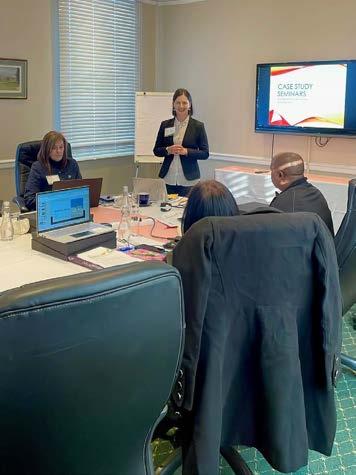

There were also various presentations on marketing trends in Africa, as well as advice on preparing a
“The delegates are senior marketers and at this level a case study is a magnificent way to consolidate experience, as well as look at new areas of interest. Cases fall at the perfect intersection of where academia meets practice,” Barnardo says.
Describing the ideal case study, she explains that case study methodology is a large research umbrella, with sub-sets of many types of cases within that.
“Within the general case study outline, delegates have the scope to
Initial group of delegates – all experienced marketers in their own right – are on their way to achieving the prestigious CM(A) designation.› Claire Barnardo, Case Writing Centre Manager at the University of Cape Town Graduate School of Business, provides tips
bring their personal touch to it, and this is also what makes a case so unique in comparison dissertations. A unique output for a unique programme. It’s a neat fit,” Barnardo states.
A Marketing Knowledge Presentation has already been made by each delegate. The Case Study submission and presentation is due in October.
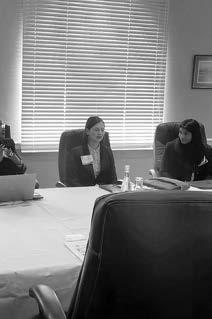
STRONG INTEREST IN THE CM(A) FROM ACROSS THE CONTINENT
Helen McIntee, President of the African Marketing Confederation, says there has been strong interest from across the continent in the CM(A) programme, with the second intake of candidates likely in November 2023.
“This prestigious designation is awarded to qualifying senior marketers in recognition of their experience and skills, and equips successful candidates to operate effectively in the continent’s complex and diverse markets,” she explains.
“We believe we have put together a programme of outstanding quality, and academic and professional rigour.
“The CM(A) credential is only awarded
to top marketers who prove that they are among the most knowledgeable, highly qualified and accomplished professionals on the continent.”
The criteria for marketing professionals to apply for the Chartered Marketer (Africa) designation include 10 years’ broad marketing experience – three years of which has been completed at a senior level. Applicants must also have a recognised marketing degree that can be authenticated by a marketing institutional authority and is also recognised by the relevant AMC member country’s national marketing body.

Applicants need to hold the highest industry or professional accreditation in their own country. Current membership of an African marketing body which is a certified member of the AMC is also required.
McIntee notes that alternative arrangements can be made if there is not a marketing association or institute in the applicant’s country. The application process includes the submission of a full portfolio of qualifications and experience (PQE).
You can find out more about the Chartered Marketer (Africa) here
Ugandan industry bodies come together for a day of fun


ALL WORK AND NO play is not good for the soul! With this in mind, the Uganda Marketers Society (UMS) recently orchestrated a ground-breaking and fun-filled event that brought together three prominent industry bodies: the UMS, the Public Relations Association of Uganda, and the Uganda Advertising Association.
Under the bright Kampala skies, members from all three associations came together to participate in an array of exciting activities that catered to diverse interests.
The Meet & Greet Fun Day was filled with an abundance of networking opportunities, exhilarating games, and an overall emphasis on wellbeing and fun.
“From competitive football matches and invigorating aerobics sessions to intense tug-of-war battles and speedy sack races, the spirit of healthy competition and solidarity was alive and thriving,” the UMS says in a media statement.
“Additionally, participants enjoyed engaging in mind-stimulating quizzes,

An abundance of networking opportunities, exhilarating games, and an overall emphasis on wellbeing and good times.
board games like puzzles, and even indulged in the timeless classic of ‘truth or dare’.”
ASSOCIATION LEADERSHIP ARE PART OF THE FUN
Lending their support and actively participating in the event were

leadership figures from the three associations: Tina Wamala, representing the Public Relations Association of Uganda; Frank Muthusi from the Uganda Advertising Association; and David Balikuddembe from the Uganda Marketers Society. They showcased true leadership
Forging new friendships
qualities and set a positive example for everyone in attendance.
Away from the thrill of the sometimesintense competition, attendees were able to engage in discussions, exchange ideas, and forge new friendships – ultimately strengthening the bonds within the marketing, public relations and advertising community.
“The Meet & Greet Fun Day served as a reminder that fostering a sense of community and promoting holistic wellbeing are essential for professionals in these industries,” the UMS says.
“The Uganda Marketers Society, alongside the Public Relations Association of Uganda and the Uganda Advertising Association, created an event that blended business and pleasure, leaving participants energised, inspired and more connected than ever before.”

Maiden edition of Africa-wide public relations & communications report unveiled

LAGOS-BASED BHM Research & Intelligence
(BR&I) has launched the maiden edition of the ‘Africa PR and Communications Report’ with data, facts and statistics on the continent’s public relations industry.
The report provides insights into the current state of the industry, including the challenges and opportunities available to practitioners and stakeholders.
“Employing compelling data analyses and professional experience, the [report] underscores the importance of understanding emerging trends, the unique needs of practitioners, and the necessary actions to elevate PR practice
on the continent,” the company says in a statement.
Among the findings of the study, gathered from more than 500 practitioners across 29 countries:

• 11% of respondents are concerned about ‘quacks’ and ‘charlatans’ in the industry.
• Economic instability (21%), and lack of funding or cash flow (17%) represent two of the prime issues facing businesses or clients in Africa.
• 17.3% of respondents predict that ar tificial intelligence (AI) will be a major factor in the practice of PR in the next five to 10 years.
“This is the first step in rallying all practitioners and stakeholders on the continent to understand what is possible and actions to embark upon. But we must first acknowledge that no significant influence can be achieved without key data and information,” says Ayeni Adekunle, BHM Research & Intelligence founder and ‘Africa PR and Communications Report’ Committee chair.
INSIGHTS WILL SHAPE PR ON THE CONTINENT

“We are enthused about the new insights provided in the [report] and how they’ll shape PR and communication practice in Africa as we know it, for the benefit of the continent and its one-billionstrong people.”
Adds Moliehi Molekoa, an adviser on the committee and the Managing Director of Magna Carta, a pan-African reputation management consultancy: “The time has come to immortalise the art of PR in Africa, harnessing the wealth of resources and opportunities at our disposal – while taking advantage of information, data and expert insights to unleash our extraordinary professional prowess.
“With Africa’s resounding pursuit of growth and the recognition bestowed upon it, the [report] not only elevates the skill level and practice within the industry, but also propels us into a position of influence, fortifying the continent’s reputation and ultimately ushering prosperity for the African people.”
PECULIARITIES ACROSS MARKETS

According to the research team, the PR and communications industry in Africa presents several peculiarities across different markets, such as:

• Cultural and linguistic diversity: The continent of Africa is home to a wide range of cultures and languages, which can make it challenging for PR practitioners to effectively communicate with different audiences across countries. Professionals across the survey generally agreed that the industry was culturally diverse and wellrounded. In countries such as Nigeria, Rwanda, Ghana, South Africa and Kenya, 58.7% of Englishspeaking professionals agreed that
the industry was culturally diverse, while 41.3% argued differently. For Portuguese-speaking professionals in countries like Mozambique and Angola; and French-speaking professionals in Benin Republic and Ivory Coast, 66.7% and 61.9% of participants agreed that their industries were culturally diverse.
• Low public trust in PR: In some African countries, the public has a low trust in PR and communications professionals, which makes it difficult
› PR can foster meaningful connections and build trust with target audiences› The ‘Africa PR and Communications Report’ gathered insights from more than 500 practitioners across 29 countries
for PR practitioners to effectively engage with stakeholders. Participants in in-depth interviews and focus group discussions cutting across Nigeria, South Africa, Kenya and Egypt admitted to the dwindling trust in PR as the populace becomes more politically conscious and has increased access to the internet. “The drop in trust is a global concern. The 2022 Edelman Trust Barometer reveals that over the last decade, trust in all news sources has dropped, except for owned media (43%), which rose one point,” the report states.
• Limited access to mediums and the internet: In parts of Africa, access to traditional media such as radio and newspapers remains prevalent. According to Afrobarometer, more than 80% of people in Africa own a mobile phone with access to a mobile phone network. Yet, the International Telecommunications Union’s ‘Measuring Digital Development Facts and Figures 2022 Report’ indicates that only 23% of Africans in rural areas have access to the internet, which makes it challenging for PR practitioners to effectively reach audiences as quickly as possible.
• Limited PR professionals: From content analysis in this research, there is a limited number of easily recognisable PR professionals in smaller countries such as Cape Verde, Eswatini, Comoros, Mauritius and a few others. This can make it challenging for businesses and organisations to find qualified PR practitioners to work with, and for young university graduates to aspire to.
• Lack of regulation: In a number of African countries, the PR industr y is poorly regulated, which has led to ethical issues and a lack of accountability. In all survey locations, media and members of the press are seen as key
stakeholders in the industry. With so many players sharing the PR and communications space, a regulatory body is needed to oversee processes and ensure propriety. Other important stakeholders who can drive this agenda are social media influencers and the heads of PR and communications across the different organisations (whether private or public). “The case where anyone with media or journalism experience can open a PR firm and compete for clients, resulting in proliferation and opportunism, should not be allowed. A proper professional body is needed to grant licences to professionals, similar to the standards that exist in the fields of law and medicine. Training, monitoring and control of professionals are essential,” the report states.
LOOKING TO THE FUTURE
Looking ahead to the future of public relations on the continent, the researchers say the industry is undergoing a transformative phase, driven by shifting dynamics in technology, communication and the continent’s socio-economic landscape. As Africa continues to grow and evolve, the future of PR holds immense potential and opportunities.
“To put the worth of the African PR and comms industry in perspective, Statista says Africa’s annual ad spend alone is worth US$5.1-billion. As the industry enjoys speedy growth, it can be attributed to increased recognition of the value of effective communication in building and managing relationships between organisations, governments and the public,” they observe.
“In the digital age, technology plays a crucial role in shaping the future of PR in Africa. More emerging themes such as streaming, AI, blockchain and
broadband internet penetration (5G and more) are changing marketing, media, communications and consumer behaviour in Africa. The rise of social media platforms and streaming services such as Showmax, Netflix and Prime Video are also contributing to the change in the perception of Africa as the ‘Dark Continent’.”
According to the study, the demand for data-driven decision-making is also shaping the future of PR in Africa. As organisations strive to measure the impact of their PR efforts, data analytics and insights become vital tools. By leveraging data from social media, website analytics and audience demographics, PR professionals can refine their strategies, optimise messaging and demonstrate tangible results to stakeholders.
The research team believes the future of PR in Africa lies in its ability to navigate cultural nuances and cater to diverse audiences. With over 1,500 languages (OECD, 2022) spoken across the continent, PR professionals must employ localised and culturally relevant communication strategies. By understanding the cultural context, values and aspirations of different African societies, PR can foster meaningful connections and build trust with target audiences.
“Furthermore, the future of PR in Africa lies in its role as a catalyst for positive change. PR professionals are increasingly focusing on corporate social responsibility (CSR) initiatives, sustainability and ethical practices. By promoting transparency, accountability, and social impact, PR can contribute to Africa’s development agenda and enhance the reputation of organisations operating on the continent,” they say.
A division of Black House Media (BHM), BR&I has produced all the editions of the ‘Nigeria PR Report’ since its inception. This report was the forerunner of the new ‘Africa PR and Communications Report’.
Readers of our Digital Edition can download a copy of the report here
A regulatory body must oversee PR





Top-notch speakers and big turnout for the National Institute of Marketing of Nigeria’s annual conference in the city of Abuja.
Nigerian marketers discuss the profession’s role in nation building

THE NATIONAL INSTITUTE of Marketing of Nigeria, a founder member of the African Marketing Confederation (AMC), recently held its annual NIMN Marketing Conference in the city of Abuja.

For 2023, the key theme of the oneday event was the role that marketing and ethics can play in nation building.
Lolu Akinwunmi, Group CEO of Prima Garnet Africa, a leading marketing communication group in Nigeria, was the keynote speaker on the theme topic. Akinwunmi is a “respected and accomplished leader in the marketing communication industry, a role model for young professionals, and an inspiration to the marketing communication community in Nigeria”, the NIMN said.
There were also panel discussions on ‘Marketing as a Catalyst in Nation Building’ and ‘The Role of Ethics in Nation Building’.
EXPERT GROUP OF PANELLISTS
Among the panellists were Dr Nechi
Dr Ezeako is an esteemed professional with over 30 years of expertise in the consulting, financial services, manufacturing, and not-for-profit sectors. Prof Uzo is Professor of Marketing and Academic Director of the Africa Retail Academy at the Lagos Business School.
At the conference, Prof Uzo also announced a groundbreaking collaboration between Lagos Business School and the NIMN. “This revolutionary partnership is set to transform the landscape for Nigeria’s marketing professionals, empowering
them with thought leadership, lifelong learning, and management development opportunities,” he said.
Summing up the 2023 conference in a LinkedIn post, the NIMN said the event “was an absolute blast – filled with excitement, packed sessions, and inspiring industry leaders as panellists”.
The NIMN added: “The discussions revolved around the crucial role of marketing in nation building, sparking new ideas and strategies for driving positive change. But it wasn’t all business – networking opportunities were abundant, fostering connections that will shape the future of marketing.”


Global Thoughts, Local Leaders

8 - 9 November 2023



IMM Graduate School, Parktown, Johannesburg




Get insights from international and local industry giants as they share what it means to be a marketer in 2023.
BOOKINGS OPEN

